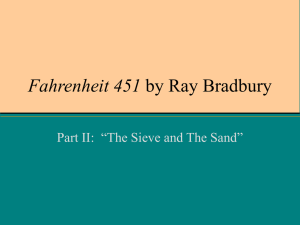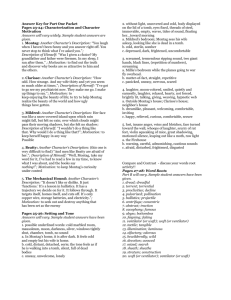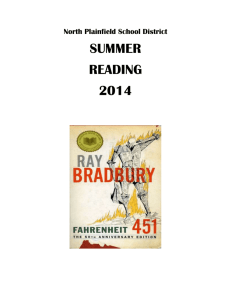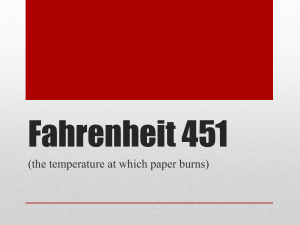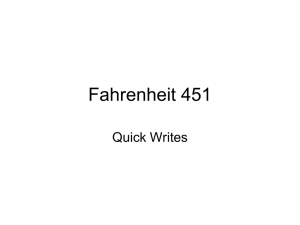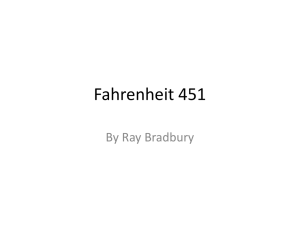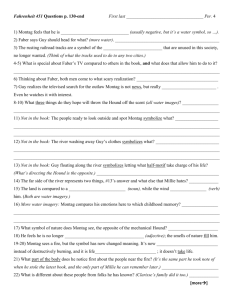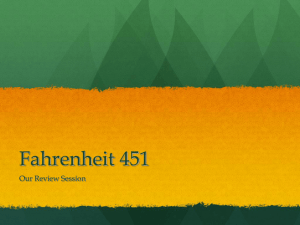Fahrenheit 451: Part 3 Discussion Questions
advertisement
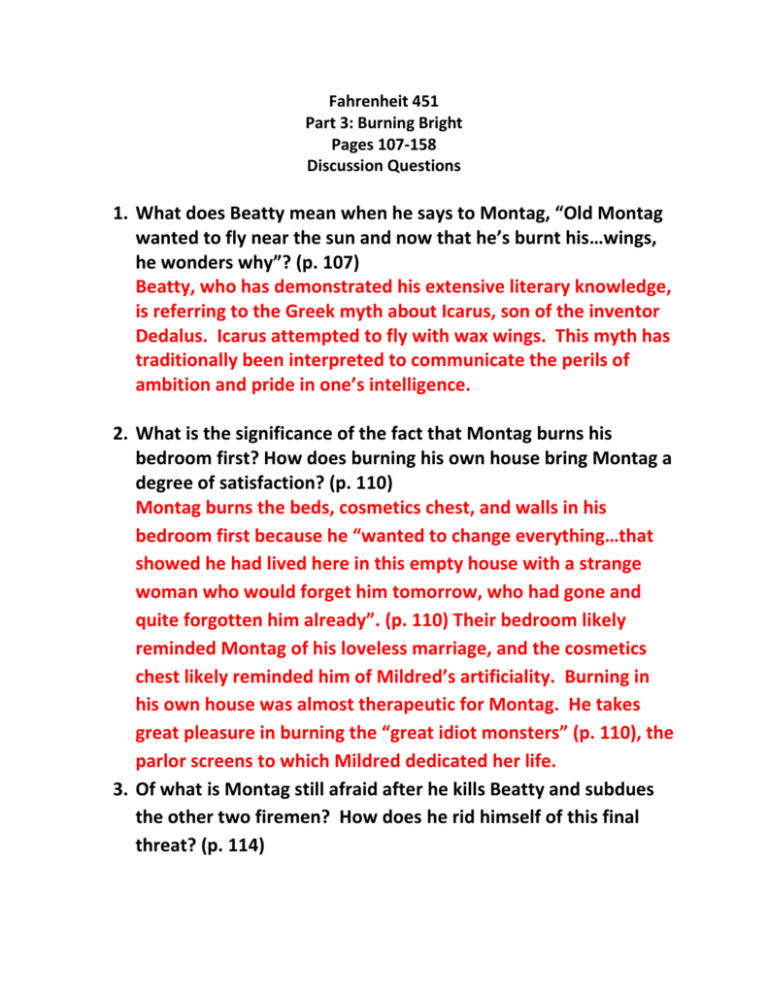
Fahrenheit 451 Part 3: Burning Bright Pages 107-158 Discussion Questions 1. What does Beatty mean when he says to Montag, “Old Montag wanted to fly near the sun and now that he’s burnt his…wings, he wonders why”? (p. 107) Beatty, who has demonstrated his extensive literary knowledge, is referring to the Greek myth about Icarus, son of the inventor Dedalus. Icarus attempted to fly with wax wings. This myth has traditionally been interpreted to communicate the perils of ambition and pride in one’s intelligence. 2. What is the significance of the fact that Montag burns his bedroom first? How does burning his own house bring Montag a degree of satisfaction? (p. 110) Montag burns the beds, cosmetics chest, and walls in his bedroom first because he “wanted to change everything…that showed he had lived here in this empty house with a strange woman who would forget him tomorrow, who had gone and quite forgotten him already”. (p. 110) Their bedroom likely reminded Montag of his loveless marriage, and the cosmetics chest likely reminded him of Mildred’s artificiality. Burning in his own house was almost therapeutic for Montag. He takes great pleasure in burning the “great idiot monsters” (p. 110), the parlor screens to which Mildred dedicated her life. 3. Of what is Montag still afraid after he kills Beatty and subdues the other two firemen? How does he rid himself of this final threat? (p. 114) Montag is afraid of the Mechanical Hound, which he knows is still at large nearby. The Hound appears quickly, and with its procaine needle “tooth,” advances on Montag to kill him. However, Montag uses the flamethrower to “burst its metal bones at the joints, and (blow) out its interior in a single flushing of red color like a skyrocket fastened to the street” (p. 114) 4. Do you agree with Montag that Beatty wanted to die? (answers will vary, reread p. 87, 113, 116). Beatty is a complex character. As someone with great knowledge of literature, Beatty may have felt ambivalent about continuing to burn books. Notice the delight he takes in quoting literature in front of Montag—this may have reawakened his love for literature and stirred up repressed doubts about his life’s purpose. Even Faber suspects that Beatty may have secretly sympathized with their cause: “He could be one of us. God knows” (p. 87). Beatty doesn’t try to run away when sees Montag’s fingers twitch on the safety catch of the flamethrower; instead, he deliberately quotes lines of poetry that he knows will provoke Montag and taunts him to pull the trigger. On the other hand, to assuage his own guilt, Montag may only want to believe that Beatty wanted to die. 5. How does Montag relate to nature once he is thrust into it? (p. 133) Though his recent reading has made him idealize nature, Montag’s first actual experience in nature is eye-opening: “He was moving from an unreality that was frightening into a reality that was unreal because it was new” (p. 133). The river is cold, and the starts threaten to “crush him.” (p. 133). Viewing the moon, Montag struggles to remember grade-school explanations of celestial bodies. Memories of a childhood visit to a farm trigger a pastoral fantasy about sleeping in a barn, but when Montag leave the “comforting” river, the wilderness seems violent and disturbing. He even mistakes a deer for the Mechanical Hound. He has been so isolated from natural sensory experiences that the smells and sights of the countryside almost overwhelm him. When he reaches the hobo camp, he is surprised to find that fire can be warm and comforting. 6. Why is Montag mesmerized by the conversation he overhears as he hides in the woods observing the hobos around the fires? (p. 140) How does this connect back to Clarisse? (p. 28) 7. Explain the hobo’s reasoning for memorizing famous works rather than carrying actual copies. (p. 145) 8. Describe the many “deaths” of Mildred. Why do you think Montag feels conflicted about Mildred at different times in the novel? (p. 152) Work on Discussion Questions


